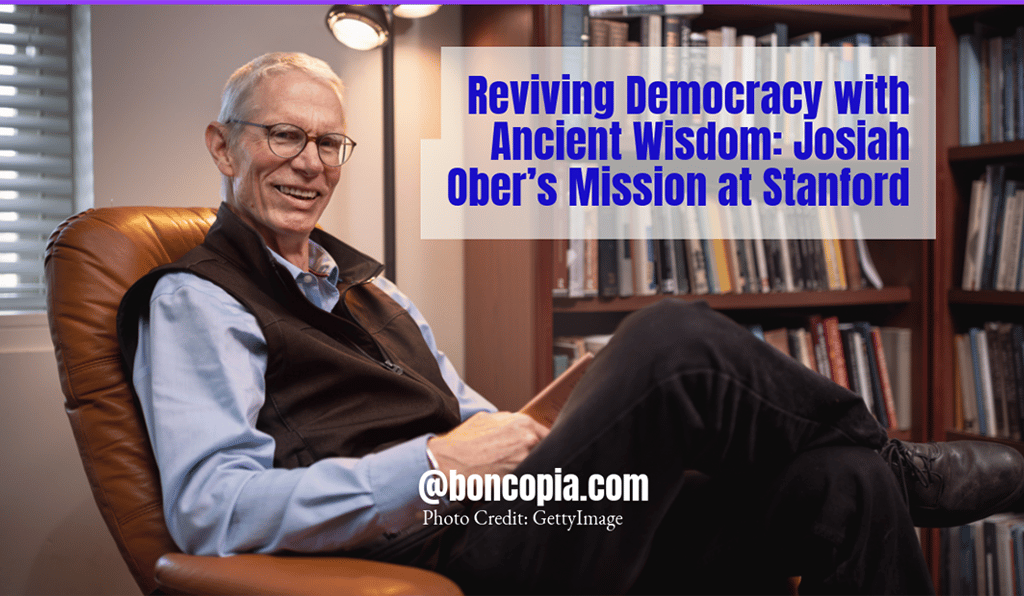Reviving Democracy with Ancient Wisdom: Josiah Ober’s Mission at Stanford
5/6/20254 min read


Reviving Democracy with Ancient Wisdom: Josiah Ober’s Mission at Stanford
What can ancient Athens teach us about democracy today? At Stanford University, political scientist Josiah Ober is on a mission to answer that question, drawing lessons from the past to inspire a new wave of civic responsibility. Through the Stanford Civics Initiative, Ober is blending history, political theory, and education to revitalize democracy in a time when it’s needed most. At Boncopia.com, we’re exploring Ober’s groundbreaking work, its roots in a pivotal moment of his career, and how it can empower us all to be better citizens. Let’s step back in time—and look forward to a stronger democratic future.
A Turning Point in 1983: From Rejection to Revelation
Josiah Ober’s journey into the heart of democracy began with a setback. In 1983, as a young assistant professor at Montana State University, Ober faced a career crisis when the Greek government denied his application for archaeological fieldwork. With tenure looming, he pivoted to a new focus, revisiting notes he’d taken on a speech by the Greek orator Demosthenes. What struck him was a paradox: Demosthenes, a wealthy elite, publicly criticized the very privileges he enjoyed.
This contradiction sparked Ober’s curiosity. Over the next six years, he dove into the dynamics of Athenian democracy, examining how elite and non-elite citizens coexisted and collaborated. His research culminated in the seminal book Mass and Elite in Democratic Athens (Princeton University Press, 1989), which revealed how public rhetoric bridged social divides, fostering a shared democratic culture.
Lessons from Athens: Democracy as Cooperation
Ober’s work centers on a timeless question: How do people with vastly different backgrounds and interests cooperate in a democracy? In ancient Athens, this was no small feat. As Ober notes in a 2019 Kleros interview, Athenian democracy thrived because it was highly institutionalized, with laws and systems that constrained majority power while encouraging collaboration. Athenians found ways to live productively despite deep differences—a challenge that resonates in today’s polarized world.
His book The Civic Bargain: How Democracy Survives (Princeton University Press, 2023), co-authored with Brooke Manville, expands on this idea. Drawing from ancient Greece to America’s founding, Ober argues that democracy survives through a “civic bargain”—a mutual commitment to cooperation over domination. It’s a lesson that feels urgent as democratic institutions face strain globally.
The Stanford Civics Initiative: Educating for Democracy
At Stanford, Ober is putting theory into action through the Stanford Civics Initiative (SCI). Launched under his leadership, SCI aims to inspire democratic citizenship through courses and programs focused on civic education. Operating within both the School of Humanities and Sciences and the Hoover Institution’s Center for Revitalizing American Democracy, the initiative encourages students to think critically about their roles as citizens.
SCI isn’t just about lectures—it’s about engagement. Ober’s courses explore how democratic principles from Athens apply today, tackling issues like political equality, social inequality, and the power of public discourse. By blending history with modern challenges, he’s equipping a new generation to strengthen democracy through active participation.
Why This Matters Now
Ober’s mission comes at a critical moment. Democracy worldwide is under pressure, with rising polarization, misinformation, and distrust in institutions. In the U.S., civic education has often taken a backseat, leaving many citizens unsure of how to engage meaningfully. Ober’s work reminds us that democracy isn’t a spectator sport—it requires active, informed participation.
His research also highlights the power of rhetoric in bridging divides. In Athens, public speech allowed elites and the masses to negotiate their differences, creating a shared ideology that sustained democracy. Today, as social media amplifies division, Ober’s insights suggest we need better ways to talk, listen, and cooperate across ideological lines.
Applying Ancient Lessons to Modern Life
Ober’s ideas aren’t just for academics—they’re for all of us. At Boncopia.com, we see parallels in how our community thrives through collaboration. Whether you’re a buyer, seller, or entrepreneur, engaging with others respectfully and constructively mirrors the civic bargain Ober describes. His work challenges us to ask: How can we contribute to our communities, online and offline, in ways that strengthen our shared future?
For example, consider a local debate over a new policy in your area. Instead of retreating to echo chambers, Ober’s approach would encourage seeking out diverse perspectives, listening to understand, and finding common ground—much like Athenians did through public discourse.
Ober’s Legacy: A Call to Action
Josiah Ober’s journey—from a rejected fieldwork application to a leading voice on democracy—shows how setbacks can lead to breakthroughs. His Stanford Civics Initiative is planting seeds for a more engaged citizenry, while his books offer a blueprint for sustaining democracy through cooperation. As he told Kleros, “We shouldn’t believe when people say ‘democracy is a nice idea, but it could never work.’” Athens proved it can—and so can we.
At Boncopia.com, we’re inspired by Ober’s mission to foster connection and understanding. Our platform is a space to practice these democratic values—collaborating, sharing knowledge, and building community. Let’s take Ober’s lessons to heart and become the kind of citizens who keep democracy alive.
Thought-Provoking Questions to Ponder
How can you apply the “civic bargain” concept to a current issue in your community or online space?
What role does public discourse play in your life, and how can you engage more constructively in tough conversations?
Ober’s work emphasizes cooperation over domination—where do you see opportunities to prioritize collaboration in your daily interactions?
Join the conversation on Boncopia.com and share your ideas. Let’s build a stronger democracy, one thoughtful step at a time!
hello@boncopia.com
+13286036419
© 2025. All rights reserved.